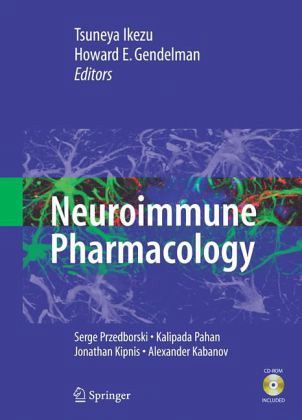
Neuroimmune Pharmacology
Versandkostenfrei!
Nicht lieferbar
"The chapters contained in this volume show scientific relationships among historically separated fields. This allows a unique opportunity for scientists and students to gain broad knowledge in disparate fields of clinical medicine and biomedical research. Overall, the text integrates cutting-edge neuroscience, immunology, pharmacology, neurogenetics, neurogenesis, gene therapy, adjuvant therapy, proteomics, and magnetic resonance imaging. It is a rich harvest and readers will gain a perspective that has not been readily available. Exposure to such a wealth of ideas is bound to inspire readers to undertake new and productive research initiatives. In summary, this is a volume not to be put on the shelf as a reference, but to be read cover to cover by aspiring neuroscientists."
Dr. Patrick L. McGeer, Professor Emeritus, Kinsmen Laboratory of Neurological Research, University of British Columbia
"This exciting new textbook, Neuroimmune Pharmacology, reflects the history and vision of the Society on NeuroImmune Pharmacology and of the Society’s official publication, the Journal of Neuroimmune Pharmacology. All three represent deliberations arising from a relatively young, interdisciplinary, and dynamic field of research, which have major translational implications for neurodegenerative, neuroinflammatory, neuropsychiatric diseases, and infections of the nervous system. They all demonstrate the synergistic value of integrating the parts: Neuroscience, Immunology, and Pharmacology. The extraordinary accomplishment of Neuroimmune Pharmacology is its comprehensive nature. It will be enthusiastically welcomed by members of the Society and will serve as the definitive resource for all students and researchers interested in various topics that are so well covered in the book."
Dr. Phillip K. Peterson, President, Society on NeuroImmune Pharmacology, Professor, Department of Medicine, University of Minnesota
Written for:
Graduate students, postdoctoral fellows, health care providers, researchers, scientists and physicians who are interested in basic and clinical aspects of how the immune system affects neurodegenerative diseases. Primary disciplines are Immunology, Neuroscience, and Pharmacology
Dr. Patrick L. McGeer, Professor Emeritus, Kinsmen Laboratory of Neurological Research, University of British Columbia
"This exciting new textbook, Neuroimmune Pharmacology, reflects the history and vision of the Society on NeuroImmune Pharmacology and of the Society’s official publication, the Journal of Neuroimmune Pharmacology. All three represent deliberations arising from a relatively young, interdisciplinary, and dynamic field of research, which have major translational implications for neurodegenerative, neuroinflammatory, neuropsychiatric diseases, and infections of the nervous system. They all demonstrate the synergistic value of integrating the parts: Neuroscience, Immunology, and Pharmacology. The extraordinary accomplishment of Neuroimmune Pharmacology is its comprehensive nature. It will be enthusiastically welcomed by members of the Society and will serve as the definitive resource for all students and researchers interested in various topics that are so well covered in the book."
Dr. Phillip K. Peterson, President, Society on NeuroImmune Pharmacology, Professor, Department of Medicine, University of Minnesota
Written for:
Graduate students, postdoctoral fellows, health care providers, researchers, scientists and physicians who are interested in basic and clinical aspects of how the immune system affects neurodegenerative diseases. Primary disciplines are Immunology, Neuroscience, and Pharmacology
Neuroimmune pharmacology seeks to harness the immune system to provide pharmacological intervention to combat neurodegenerative diseases. This book provides a comprehensive overview of topics that embrace the link between the immune system and the pathogenesis of neurodegenerative disorders. Results from recent studies strongly suggest that a major part of the process in diseases including Alzheimer's and Parkinson's as well as Prion diseases, comes from changes in the innate and adaptive arms of the brain and peripheral immune systems. Thus, the book provides an in-depth study of numerous fields including immunology, pharmacology, neuroscience and neurovirology. It is accompanied by a CD-ROM that includes access to lectures, slide presentations, and question and answers on neuroimmune pharmacology.



